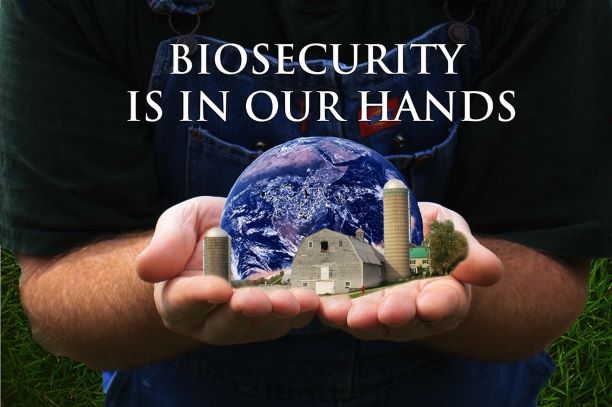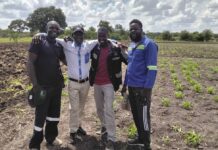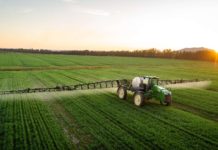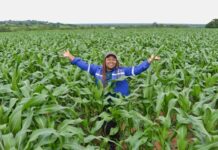By: Dr. Nimrod Israely – Founder and CEO – Biofeed Ltd.
“what this pandemic has really done is it’s accelerated trends that were already happening… and now all of those trends have been revved up… We’re experiencing 10 years of change in 10 weeks.” Andrew Yang (GZERO)
The COVID-19 crisis, like a tornado, is changing everything in its path while creating a new landscape.
The economic landscape post-COVID-19 will be different, with a much higher emphasis on health and biosecurity.
The agri-industry, and more specifically, the fresh produce and live animals’ export-oriented agri-industry, will have to change and adapt itself to new and updated regulations and demands.
WHO RUNS THE SHOW AND HOW MUCH IT COSTS?
Currently, those are The Biosecurity People that are defining the rules and imposing the most critical decisions, influencing us all at the personal, local and global economic scale.
One thing is clear; overnight, BIOSECURITY has become the leading criteria, and in most cases, the sole criteria, for -IF, WHAT, WHEN and HOW we conduct our activities and do things.
Oh yes, one more thing, for Biosecurity decision-makers, the national economic matters are secondary in priority. Do you get it? Let me say it again, economy is secondary in priority.

With a global forecast of $9 trillion knockdowns, the Coronavirus damage price tag cannot be underestimated. This is equivalent to over 10% shrink of the Gross World Product (GWP), being around $80 trillion in 2017 (Wikipedia)!

| The global economy suffers a severe blow from a small virus. The economy axis has changed. The above predictions seem moderate in comparison to others foreseeing the USA a 20% GDP deficit. |

What will the crisis change and how it will affect the agri-industry, and especially international trade, is the one thing that should concern all stakeholders and people active in the agri-industry.
NOT ALL ‘SECURITIES’ ARE THE SAME
If you Google or look on Wikipedia for the word ‘Security’ you will find mainly the following terms (in parenthesis the number of results in billions) –
Communication Security (5.99 B results), Home security (3.6B), Information-security (3.65B), Social security (3.32B), Food security (3.2B), Human security (3.29B), National security (2.9B), Self security (2.83B), Computer security (2.66B), Corporate security (1.73B), Cyber security (0.48B), Ecological security (0.12B),Homeland security (0.1B).
Interestingly Biosecurity receives only 0.005B results. In other words, until recently Biosecurity raised very little public interest. Now, this is about to change.
We should expect novel approaches towards Biosecurity when it comes to travels, food industry, and agri-industry.
Basically, anything and anyone that potentially presents a Biosecurity hazard, in the form of carrying or transferring a pest or disease will be re-evaluated and treated accordingly.
THREE DOMAINS TO BE RE-INVENT
The COVID-19 crisis already triggered many changes that affect our present daily lives. In the future, we can expect Biosecurity to play an even greater role.
This is because of its potential health risk and the devastating economic it could lead to.
Agri-industry by nature deals with ‘living organisms’. Hence, it is affected by Biosecurity and vice versa.
With a price tag to the global economy of several $ trillions, resulting from the recent Biosecurity hazard of the Coronavirus crisis, companies, investors, entrepreneurs, governments and international organizations have the required motivation to invest all efforts in making sure that such a catastrophe will never return. Governments will prioritize the advancement of measures to prevent, mitigate, and control potentially similar situations as COVID-19. This is regardless of the source of the Biosecurity hazard, be it from contact, water, air, food, animals, or fresh produce .

The three domains (protocols, technology management) reflect what I see as ‘high risk’ for those who will not adapt to the ‘different or even new rules’. At the same time, it may present the greatest opportunity for those who will.
That is especially relevant to the entire food industry, which will be looking for trusted, healthy and quality produce free of quarantine diseases and pests, assuring safety.
Biosecurity protocols – Biosecurity technologies are not a stand-alone solution for pandemics or any biosecurity hazard, no more than a gun is against a terror attack. To be effective they need to work within a frame of a suitable protocol.
Those protocols will be developed, with special reference to every form of human activity that may affect our health and/or economy.
Agricultural activities and mainly international trading with livestock and fresh produce will be most affected, and can expect higher standards and stricter requirements.
Biosecurity technologies – A plethora of technological entrepreneurs, companies, and organizations see the huge gap that exists between the current situation, which brought the world to its knees, and the one that will allow a safer world, where we can move, grow and trade (with agricultural produce) easily and freely.
They will develop state-of-the-art technologies that will help in fighting Biosecurity hazards. This will resemble what happened with Homeland security following the September 11 terror attack.
Biosecurity management – The COVID-19 proved to everyone that our blue planet is small, and we all share the same faith. The best strategy to confront future Biosecurity hazards is therefore through a more intense international cooperation.
In addition, there is an urgent need for improvement and capacity building of local Biosecurity management.
We may see new international organizations devoted solely to improve and coping with all aspects of Biosecurity hazards.
Another outcome within this domain may be the establishment of a global system aimed at helping and supporting countries sharing Biosecurity information and punishing those who do not.
PRECIOUS TIME
When big trees fall, they do not form a desert, but a better environment for young trees to grow.
Asian and African farmers are always at a disadvantage with regard to European and American farmers.
Consider the COVID-19 crisis as a once-in-a-lifetime opportunity to build a new future for your produce in the export markets. Don’t lose a minute. Now, when everybody is in panic, not active, or feeling self-pity; now is the perfect time to be more active than ever.

Analyze your situation. Think beyond today’s situation. Come up with new innovative or unique plans. Make sure your plans are ambitious enough and will make you the leader of the pack.
Start by imposing upon yourself stricter Biosecurity protocols. Tell your story, and have a positive surprise for the regulators of the importing country.
Fresh produce exporter, make sure your customers understand your high priority for advanced Biosecurity standards, and the buyers trust your produce safety and quality.
Obeying higher standards should make your customers feel safe and secure, in addition to the natural qualities and good taste your costumers already expect from your produce. COVID-19 crisis is a great opportunity for you if you are ready to work hard, act fast, decisively, and immediately – for you the future begins NOW.
Your feedback and thoughts are precious to me. Please share your thoughts with me and the manifesto with someone who needs to see it.
For questions regarding a particular country/situation please contact me at nisraely@biofeed.co.il or text me +972-5423425 (WhatsApp).








